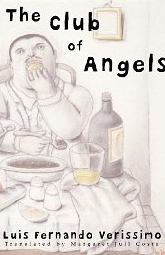“Hunger is the only recurring desire…sight, sound, sex, and power all come to an end.”
The fi rst of Brazilian author Verissimo’s novels to be translated into English, The Club of Angels is a fascinating, carefully detailed, and darkly humorous study of ten deaths, the deaths of ten gourmands following their favorite meals. The men have been friends for more than twenty years, meeting once a month for sumptuous feasts together. They represent all levels of society and have achieved differing degrees of professional success, enjoying and respecting each other because of their shared love of food and their long friendship.
rst of Brazilian author Verissimo’s novels to be translated into English, The Club of Angels is a fascinating, carefully detailed, and darkly humorous study of ten deaths, the deaths of ten gourmands following their favorite meals. The men have been friends for more than twenty years, meeting once a month for sumptuous feasts together. They represent all levels of society and have achieved differing degrees of professional success, enjoying and respecting each other because of their shared love of food and their long friendship.
When Ramos, their leader, dies of AIDS, a mysterious successor, Lucidio (whose name suggests “God’s light”) suddenly appears and begins to plan and prepare their feasts. One by one, month after month, the club members die, but no one suggests canceling the meals, each of which features the favorite main course of one of the members. In fact, Verissimo suggests that the victim’s pleasure is dramatically increased when he knows that his death is the end result of the meal. Each victim, in fact, always asks for the one extra portion of the meal, even after it becomes obvious to the club members that the person taking the extra portion will die.

Verissimo explores the phenomenon of death philosophically–“We grow up with our murderer,” he says, and “We never [know] when he [will] kill us.” But, he believes, “knowing the hour and manner of our death [is] like being presented with a plot, with a denouement, with all the advantages that detective fiction has over life.” Knowing when and how one will die is the ultimate privilege. An ironically named “Mr. Spector” features prominently in the ending, by which time only Daniel, the narrator/chronicler of the events, and Lucidio remain alive.
Playing with the reader’s perceptions from the outset, Verissimo writes with tongue firmly in cheek, the ironies piling up as the deaths continue. His observations about life and death, about men and their friendships, and about our responsibilities, if any, to each other add depth to this unusual novel. The ending, which extends the concept of “orgiastic release” to its logical conclusion, will satisfy even the most jaded reader. Strange, thoughtful, and very clever, this novel is a fine introduction to a writer whose next novel, Borges and the Eternal Orangutans, contains broader humor within a more complex, imaginative structure.
Notes: The author’s photo appears on http://portalliteral.terra.com.br
